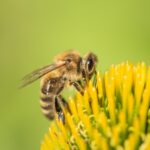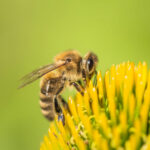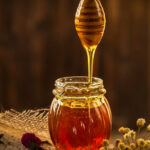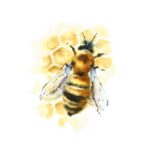Don’t Step On A Bee Day is observed every year on July 10 in the United Kingdom. Bees have been around for centuries and are closely related to wasps. They are mostly found in every part of the world that has insect-pollinated flowering plants. Bees are essential to our survival and play a big role in balancing our ecosystem. They are great pollinators, produce honey, and give us food. This day marks the importance of the existence of these insects and the work that they do.
History of Don't Step On A Bee Day
Human beekeeping has been practiced since the times of ancient Egypt and ancient Greece. Bees have even made an appearance in mythology and folklore from ancient times to the present day.
In honor of these important living creatures, Don’t Step On A Bee Day was created by Thomas and Ruth Roy and is particularly celebrated in the United States and the United Kingdom. Often misinterpreted as a day that is only focused on not willingly step on bees or harm them, the day holds a greater significance. While it is important that one is aware that walking barefoot may increase the chances of a bee sting, it is also necessary to remember the many benefits that bees bring.
The day aims to create consciousness about the conservation of bees and highlights the plight they face due to the destruction of their habitats. The insecticides, particularly those containing neonicotinoids that are fatal for bees, along with pollution, chemical exposure, and temperature changes pose a threat to their existence. To ensure that the general populace is aware of this day, there are several events held to educate people on these buzzing insects and how to take care of them and co-exist in harmony.
Bees have even found a place in popular culture. A humorous animated movie that released in 2007, “Bee Movie” showed a honey bee suing the human race for exploiting bees. Furthermore, Dave Goulson’s book “A Sting in the Tale,” which was released in 2014, describes the biology of bees and his efforts to save bumblebees in Britain.
It is important that people take cognizance of the fact that if we don’t do our bit in preserving the bees, we could drive them towards extinction, which will cause a ripple effect in ecosystems.
Don't Step On A Bee Day timeline
Europeans construct moveable comb hives to harvest honey without destroying the colony.
Karl von Frisch shows that bees communicate by the waggle dance, by which a worker bee indicates the location of a food source to other bees in the hive.
The International Union for Conservation of Nature sets up the Bumblebee Specialist Group to review the threat status of all bumblebee species worldwide.
The European Union restricts some pesticides to stop bee populations from declining further.
Don't Step On A Bee Day FAQs
Why are bees so special?
Bees are the world’s most important pollinator of food crops and, according to estimates, one-third of the food that we eat daily is due to the pollination carried out by bees.
How will bee extinction affect humans?
If bees ceased to exist one day, there would be harmful repercussions on the ecosystems. Without bees, the availability and diversity of fresh produce would decline substantially, and human nutrition would likely suffer.
Why are bees going extinct?
The bee population is appearing to decline in nations. This can be attributed to the usage of pesticides, increasing pollution, parasites, infections, and other threats. This decline can adversely impact farmers who rely on honeybees to pollinate many crops.
How To Observe Don't Step On A Bee Day
Support your local beekeepers
Beekeepers work hard to care for bees by providing them with hives, medications, and more. You can support your local beekeeper by buying some products or making a small donation to help them sustain their occupation.
Plant bee-friendly flowers
You can plant bee-friendly flowers on this day. These flowers attract bees and help them to pollinate easily by providing them with pollen and nectar. It will also help in maintaining an ecological balance.
Adopt a beehive
You can help bees by giving your support to the British Beekeepers Association in its efforts to promote bees and beekeeping. Or you can find other local beekeeper associations that you can help.
5 Buzzing Facts Facts About Bees
Thousands of species
There are actually over 20,000 species of bees.
Six is the magic number
The cells in a beehive have six sides each.
Buzzing speed
A honey bee’s wings flap at about 200 beats per second, which is also the reason for their buzzing sound.
Female worker bees
The worker bees who do all the work are female and live for about six weeks.
Male bees are drones
The male bees are drones whose sole purpose is to find a queen bee to mate with.
Why Don't Step On A Bee Day Is Important
They put food on our table
Pollination helps to make our food and bees play a vital role in that. They help produce a lot of things we eat from tomatoes, peas, apples, and strawberries. They contribute £420 million to the U.K. economy every year.
Main source of honey production
Bees are the main source of honey production. They make honey from the sugary secretions of plants by regurgitation, enzymatic activity, and water evaporation.
The bee population is on a decline
There are several nations that are seeing a concerning decline in the population of bees. This has especially been happening in the last decade owing to climate change, disruption of bees’ natural habitats, and overuse of pesticides.
Don't Step On A Bee Day dates
| Year | Date | Day |
|---|---|---|
| 2025 | July 10 | Thursday |
| 2026 | July 10 | Friday |
| 2027 | July 10 | Saturday |
| 2028 | July 10 | Monday |
| 2029 | July 10 | Tuesday |






















